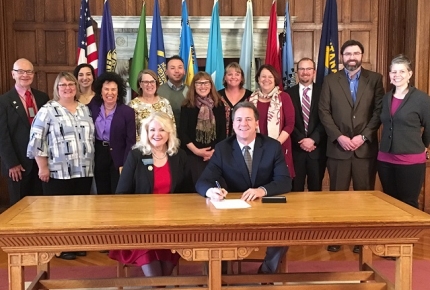
Helena, MT—April 21, 2017—Today, Governor Steve Bullock offered hope to thousands of Montanans facing cancer and other chronic illnesses by signing into law House Bill (HB) 285 to improve their quality of life through palliative care.
Palliative care provides relief from physical, emotional and social side effects and symptoms, such as pain, stress and fatigue, that accompany a serious illness like cancer. Contrary to some misconceptions, palliative care is not end-of-life care—it is appropriate at any age and any stage of a disease. It is provided by a team of doctors, nurses, pharmacists, and other specialists working alongside a patient’s doctor to provide an extra layer of support, often at the same time as curative treatment.
"Patients should have the option to maintain a strong quality of life while suffering from a major illness,” said Governor Bullock. “Thanks to a strong partnership at the state level, we will be able to keep patients and their loved ones comfortable.”
HB 285, sponsored by Representative Wendy McKamey, was supported by the American Cancer Society Cancer Action Network (ACS CAN) and numerous other patient and medical organizations. It will:
• Establish a State Palliative Care and Quality of Life Advisory Council within the Department of Health & Human Services. The council of experts in palliative care, nursing, social work, pharmacy and spiritual health, as well as caregivers and Medicare and Medicaid experts, will address challenges and opportunities for palliative care and make recommendations to the state.
• Educate the public and health care providers about palliative care through an online repository of resources about palliative care services, including continuing educational opportunities for providers and best practices.
“We are grateful to Representative McKamey, the Legislature and Governor Bullock for supporting this legislation to decrease patient suffering and improve treatment outcomes,” said ACS CAN Montana Government Relations Director Kristin Page Nei. “By increasing awareness of and access to this crucial patient-centered care, Montanans with serious illnesses like cancer can get better faster and easier.”
When palliative care is used proactively, overall patient costs decrease. Studies show that cancer patients receiving palliative care during chemotherapy are more likely to complete treatment, stay in clinical trials and report a higher quality of life than those who did not receive palliative care. Studies also show that palliative care extends the life of patients.
“Without the outstanding palliative care I received from a Montana oncologist 21 years ago, I would not have survived my cancer treatments or be alive to advocate for hundreds of patients to find quality palliative care,” said Elizabeth “Bess” Harris, ASC CAN volunteer and cancer survivor. “HB 285 advances and extends lifesaving, pain relieving strategies for Montanans who are fighting for their lives. Many times, palliative care is the most effective weapon against a life-threatening illness.”
While palliative care services exist in many Montana hospitals, there is an overall lack of understanding about its benefits from both providers and the public.
An ACS CAN and Centers to Advance Palliative Care survey found 70 percent of Americans are “not at all knowledgeable” about palliative care. Once people understand what palliative care is and its benefits, 92 percent of Americans want this type of care for themselves or their families.
To date, 17 states have passed palliative care legislation, including Montana, Wyoming, Nebraska and Arkansas this year.
ACS CAN, the nonprofit, nonpartisan advocacy affiliate of the American Cancer Society, supports evidence-based policy and legislative solutions designed to eliminate cancer as a major health problem. ACS CAN works to encourage elected officials and candidates to make cancer a top priority. ACS CAN gives ordinary people extraordinary power to fight cancer with the training and tools they need to make their voices heard. For more information, visit www.fightcancer.org.
# # #